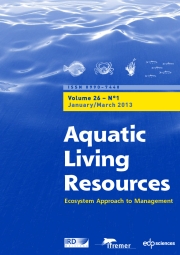Article contents
The effect of restrictive policy instruments on Belgian fishing fleet dynamics
Published online by Cambridge University Press: 09 October 2008
Abstract
Even with the rapid changes in the level of complexity and the uncertainty of the environment in which Belgian sea fisheries operate, fisheries management in Belgium is still mainly based on restrictive policy instruments founded in the biological approach of fisheries management science. Since they will continue to play an important role, this paper evaluated changes in three restrictive policy instruments and their effect on future fleet performance and dynamics, i.e. maximum fishing days, total quota-restrictions and licences. These effects are tested through scenarios in a microeconomic simulation model, including sensitivity analysis. This study opts for a dynamic simulation model based on a microeconomic approach of fleet dynamics using system dynamics as a modelling technique (operational base: Vensim®DSS). The results indicated that changes in maximum fishing days and total quota resulted in higher fluctuations in fleet performance and dynamics compared to changes in licences. Furthermore, changes in maximum fishing days and total quota had a direct impact on fleet performance, though not always as expected, whereas licences only affected fleet performance indirectly since they only limit the entry of new vessels to the fleet and they can block the growth of successful sub fleets. The outcomes of this study are translated into practical recommendations for improving fisheries management. Firstly, policy makers need to be more aware of misperceptions of feedback. Secondly, the results proved that altering only one type of restrictive policy instrument at a time often fails to meet desired outcomes. Therefore, policy makers need to find a balance in combining policy instruments. Finally, this paper opens the discussion on the future value of restrictive policy instruments in the rapidly changing, complex and uncertain fisheries environment. It suggests rethinking their use from “preserving a status quo and social peace” toward a driving factor in “stimulating fleet dynamics”.
Keywords
- Type
- Research Article
- Information
- Copyright
- © EDP Sciences, IFREMER, IRD, 2008
References
- 5
- Cited by


